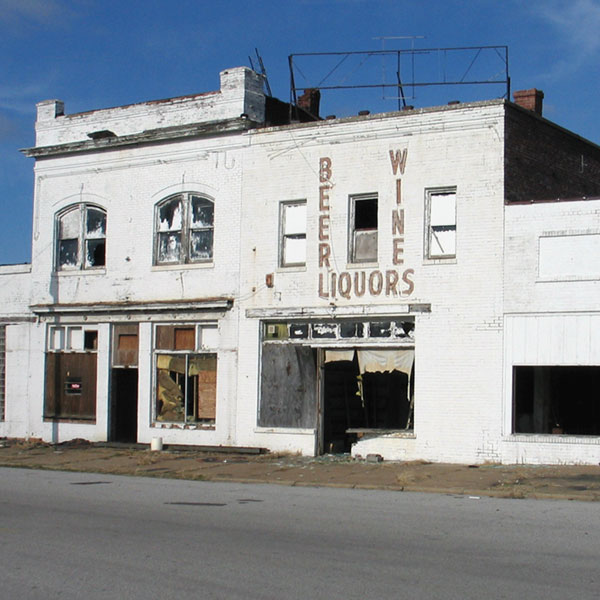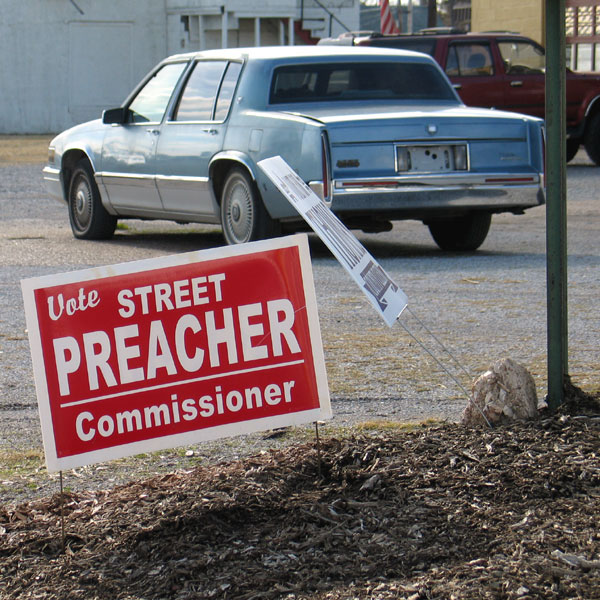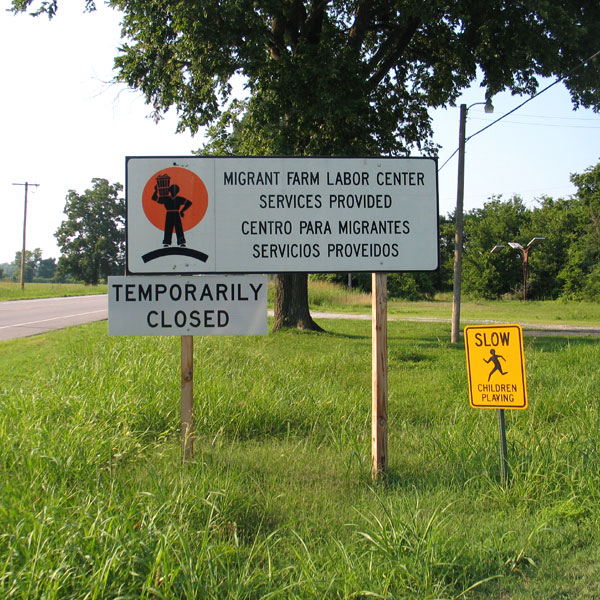
U.S. Census Bureau / Cairo, Illinois
TerraServer / Aerial Photo
Without Sanctuary / Photographs and Postcards of Lynching in America / James Allen
View of Commercial Avenue, Cairo, a few feet from where Will James was lynched. November 11, 1909, Cairo, Illinois.
Gelatin silver print. Real photo postcard. 5 1/2 x 3 1/2"
Etched into negative: "X spot where Will James, body was riddled with bullets, after being lynched Nov 11th 09 at Cairo Ill." Ink inscription on reverse: "This Picture is taken from the NE Cor. of 8th and Commercial Avenue Nov1109." Addressed to "Mrs. Jake Petter, 2057 Broad St, Paducah Ky."
Circa 1907, Cairo, illinois. Gelatin silver print. Real photo postcard. 3 1/2 x 5 1/2" ink inscription under oval portrait, "Will James (alias) Froggie."
"Half- Burned Head of James on Pole" in Candee Park. November 11, 1909, Cairo, Illinois. Gelatin silver print. Real photo postcard. 3 1/2 x 5 1/2" ink inscription on reverse: "This Pole is in Candee Park. Enter section of Washington avenue and Elm st which have Will James (alia) Froggie half Burnt Head." Etched into negative, "Half Burned Head of James" and photographers name, "leBlock."
Addressed to "Mrs. Jake Petter, 2057 Broad St., Paducah, Ky."
Will James likely sat for this portrait at a local postcard photographer's studio, a popular and inexpensive fashion of the time. This is the first image of the James lynching in a series of fifteen real photo postcards. Other images not reproduced here include the home of his alleged victim, Miss Anne Pelley; the home of the seven-year-old daughter of Mr. Boren, who found the murdered Miss Pelley in an alley she was crossing on the way to her grandmother's house; the "course the hounds took"; the trains the mob took over to reach Belknap, illinois, where James was apprehended, and to return him to Cairo for a public execution.
The rope from which James was hung broke before he died. His body was then "riddled with bullets," dragged by rope for a mile to the alleged scene of the crime, and burned in the presence of ten thousand spectators. According to the New York Times, five hundred "women were in the crowd and some helped to hang the negro and to drag the body."
Lynching scene. Commercial Avenue jammed with spectators below the electrically lit Hustler's Arch. November 11, 1909, Cairo, Illinois.
Gelatin silver print. Real photo postcard. 5 1/2 x 3 1/2"
Etched in negative: "leBlock." Addressed to "Mrs. Jake Petter, 2057 Broad St, Paducah Ky."
This image was taken moments after the rope broke and Will James' body fell onto the unpaved street. Under magnification a small group of suited men peer down as if into a well.
Composite photo, Will James portrait in center and three scenes of his lynching. in top right corner the lynching site of Henry Salzner, lynched the same night as Will James. November 11, 1909, Cairo, Illinois.
Gelatin silver print. Real photo postcard. 5 1/2 x 3 1/2"
All four images of Will James and his lynching have detailed inscriptions etched into the negative. The top right photo of the site of the Henry Salzner lynching has etched in the negative, "Telephone pole on which, Henry Salzner was hanged Nov 11th 1909, for murdering his wife. Cairo, Ill." Addressed to "Mrs. Jake Petter, 2057 Broad St, Paducah Ky."
After the lynching of Will James, the mob turned its attention to the county jail, broke the white Henry Salzner out of his cell by demolishing its solid metal door, and lynched him from a telephone pole. They did not mutilate or parade his corpse or set it on fire.
Reverend George H. Babcock of the Church of the Redeemer in Cairo declared that the failure of the civil authorities to maintain "law and order made the lynchings necessary for the infliction of justice."
Lynching in the United States (Wikipedia)
Nadir of American race relations (Wikipedia)

Illinois Issues / Stephanie Zimmermann and Peg Kowalczyk
Six hours down I-57 to the southernmost tip of the state, where the Mississippi and Ohio rivers meet, is yet another pocket of Illinois poverty: Alexander County and its county seat, Cairo. There, amid crumbling 19th century mansions, a history of segregationism and steady economic decline have conspired to make Cairo one of the most impoverished places in the state. The city's population has dwindled every decade since 1920 — from a high of 15,205 to the current low of 3,632 — prompting the principal of Cairo High School to advise the 1990 graduating class to leave.
"There is still no industry here and many still don't have jobs," says lifelong Cairo resident Sarah Gatewood, resource officer for the school truancy program. "People are in a state of depression...."
In downstate Cairo, 47 percent of children live in poverty, according to the 2000 Census. Alexander County's poverty rate of 26.1 percent was the highest of any county in the state, and its infant mortality rate of 15.4 percent from 1998 to 2000 was the state's second-highest.
The Elias Ace Hardware in Cairo is open, but the Shell is closed. The Washateria is open, but the CutMart has closed. There is no McDonald's, no Burger King, no Arby's. There is no recreation center, no bowling alley, no movie theater. The Spirit House — for liquor — is open, but the Christ Temple — for souls — is closed. Churches are for sale, prices reduced. The Martin CME Temple on Poplar Street is available, its public auction sign nailed to a dead tree stump.
Congregating in the streets is now the recreational pastime. At 24th and Sycamore, a former swimming pool is permanently filled with concrete and grown over with weeds, the city's response to court-ordered integration.
In Cairo, the issue of poverty can't be separated from the issue of race. Gatewood remembers when the city's black citizens couldn't get work in white-owned businesses and when rural whites from Kentucky and Missouri were hired instead of local blacks. She recalls when the Illinois National Guard was called into Cairo in 1967 to quell racial violence.
A coalition of black organizations formed the United Front of Cairo in 1969, and the community sustained a three-year boycott of white-owned businesses. By 1971, there was nothing left to picket. Downtown businesses had closed.
"When the smoke cleared, we still had nothing," says Norma Jean Vasser, who has lived in Cairo for nearly 50 years. "White businesses closed their doors rather than integrate."
Preston Ewing, Cairo's city treasurer and resident historian, doesn't have unrealistic expectations for the city that once boasted seven railroads and attracted shoppers from across the southern Illinois region. "Our goal should be to stabilize Cairo, not talk about growth," he says. "Potential employers will go where there is greater viability and an infrastructure to support businesses."
"Singer Evokes Turbulent History of Cairo, Illinois"
The saga of Cairo, Ill., includes a prominent link to the Lewis and Clark Expedition and a key role in the Western campaign of the Civil War. But the town at the southernmost tip of the state is also known for a sad history of racial strife. Stace England's new CD, Greetings from Cairo, Illinois, evokes the town's turbulent past with a haunting mix of barbershop, blues and backwoods rock 'n' roll.
"Lessons from Cairo, Illinois"
I learned all I needed to know about the Civil Rights movement from a box of Crayola Crayons. It happened in 1967, the year I entered first grade at Emerson Elementary, back in my hometown of Cairo, Ill.
Stace England / Greetings from Cairo, Illinois
Cairo Illinois is the strangest city on the river. It feels like your visiting a motion picture set from the 1950s and all the actors, save a few strays, have cleared the streets to hide from some impending doom. You glance back over your shoulder expecting to see the alien spaceships begin their attack or a six story high praying mantis chewing on the power lines.

"A Conversation with Senator Barack Obama (D-IL) and Aspen Institute President Walter Isaacson"
Saturday, July 2, 2005
Audience Member: Hi, my name is Jonathan [inaudible] Chicago South Side and live in Carbondale now. It's been a generation since Shirley Chisholm ran for President, and you were just elected to the United States Senate. How do you believe that white privilege will either evolve or dissolve in the 21st century?
BO: This is probably a good place to end because, you know, one of the running themes in American life has been a cycle in which we expand opportunity and citizenship and then contract it during difficult times, where we think only about us and them, but then "us" sort of expands to include more and more people, and race has obviously been at the heart of that. And do I think that we're going to entirely eradicate racism, tribalism in this country? No, because we are imperfect. That's the human condition. Can we continue to make progress so that my children have more opportunity than I had and my grandchildren have even more opportunity still? I certainly think that's possible.
This is probably a good place to end with a story. You say you live in Carbondale. When I ran for the US Senate, I was not favored. We had less money than a lot of candidates. We had to focus all that money in the Chicago media market where about 70 percent of the Democratic Party voters work, so we had to kind of husband our resources. We won by 30 points, much to our surprise, as well as everyone else's, and now we realize that we're just naked downstate. We haven't run any television ads down in St. Louis or in the media markets down in those areas. And so the first thing that we decide to do is to take a downstate southern Illinois tour. And Dick Durbin, my senior senator from Illinois, agrees to accompany me on a 19-city, three-day tour of southern Illinois. And we went to every town in southern Illinois. We didn't just go to Carbondale. We went to Caseyville and Edwardsville and Hillsboro and Murphysboro. We went to every "hill" and "boro" and "ville" in southern Illinois.
And one of the places we visited was a town that I'm sure you are familiar with called Cairo, Illinois. And some of you may recall that Cairo, Illinois, achieved a certain notoriety as having some of the worst racial problems of any place in the nation, as bad as anything going on in Mississippi or Alabama. And for those of you who don't know Illinois geography, southern Illinois is the South. And during the '60s and '70s, you had lynchings taking place in Cairo. You had cross burnings taking place during that period in Cairo. You had de facto segregated schools. African-Americans had very great difficulty getting jobs beyond menial work.
And so Dick Durbin and I decided to go. As we're driving down to Cairo, Illinois, he tells me, "You know, the first time I went to Cairo was during this period of tumult in the late '60s, early '70s." Dick Durbin was then working for Lieutenant Governor Paul Simon, and Paul Simon had dispatched Dick Durbin to investigate what could be done to improve the racial climate in Cairo. Dick Durbin at the time is 23 or 24, a young lawyer. He takes the bus down to Cairo, gets picked up by a local resident there, is driven to the motel where he's going to be staying. And as he's about to get out, the driver turns to him and says, "Young man, let me give you a piece of advice." Dick says, "What's that?" He says, "Don't use the telephone in your motel room." And Dick says, "Why not?" He says, "Well, the local switchboard operator is a member of the White Citizens Council and is going to report on everything that you say."
And this obviously makes Dick concerned, but he's got a job to do. He checks into the motel, goes up to his room, starts unpacking his bags, hears a knock on the door, opens the door, and there is a man standing there just peering at Dick, a mean-looking guy. Doesn't say anything at first. Finally just says, "What the hell are you doing here?" And walks away.
And now Dick's really feeling nervous — and so am I because we're pulling into Cairo as he's telling me the story. So we enter the town and we're winding down some streets. We come around the old courthouse, and suddenly we're in a big parking lot. And there are about 300 people there. And I noticed that on first impression these are people of an age that they might have been active participants in one way or another in those racial difficulties that had taken place 30 years ago.
But as I get closer, I notice that about a third of them are black, about two-thirds of them are white. And as we approach and enter the parking lot, they're all wearing these little blue buttons. And they say, "Obama for US Senate." And Dick and I get off the van, and they're smiling and taking pictures and offering autographs and offering us barbecue. And I look at Dick and he looks at me, and we knew what the other person was thinking. If you had asked Dick Durbin 30 years earlier — son of Lithuanian immigrants, father dies when he's barely out of fifth grade, mother ultimately had to support him and died early as well. If you had told him that he would be returning as the senior United States senator from the State of Illinois and that he'd have in tow a black guy born in Hawaii, with a father from Kenya and a mother from Kansas, named Barack Obama, and that not only would he be the Democratic nominee but that the people of Cairo would have a reception like this, he would have said, "This is unimaginable. It's impossible." And yet it was happening.
I think that reminds me of one of my favorite sayings by Dr. King, and a good place to end. You know, Dr. King once said, shortly after the walk over the Edmund Pettus Bridge, and at a time when people were very discouraged about the corruption movement, he said, "The arc of the moral universe is long, but it bends toward justice."
It bends toward justice, but it doesn't bend on its own. It bends because each of us in our own small ways try to bend it in that direction. We put our hand on that arc and we pull it in the direction of justice. And I think that if all of us agree on that basic precept, whether we're Republicans or Democrats, then I think that's the answer to your question.


